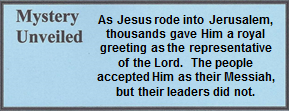13.01.03 Lk. 19:36-40; Mk. 11:8 (See also Mt. 21:8-9) Jerusalem, Sunday
JESUS ENTERS JERUSALEM
Lk. 36 As He was going along, they were spreading their robes on the road. 37 Now He came near the path down the Mount of Olives, and the whole crowd of the disciples began to praise God joyfully with a loud voice for all the miracles they had seen:
38 The King who comes
in the name of the Lord
is the blessed One (Ps. 118:26).
Peace in heaven
and glory in the highest heaven!
39 Some of the Pharisees from the crowd told Him, “Teacher, rebuke Your disciples.”
40 He answered, “I tell you, if they were to keep silent, the stones would cry out!”
Mk. 8 Many people spread their robes on the road, and others spread leafy branches cut from the fields.
“The King who comes in the name of the Lord is the blessed One.” This is an amazing statement with a profound message that is sadly, so often missed in commentaries. The crowds clearly stated that they were accepting Jesus to be their king! It was a royal greeting that is recorded five times in the gospels.[1] It is similar to a typical generic royal greeting that states, “May King [so-and-so] live forever.” What the crowds shouted when Jesus rode into town was more than a royal greeting; they said He came as a representative of the Lord! But that does not mean that they recognized Him as Deity. That would happen later after His resurrection.

“The stones would cry out.” In this context, if the people would not recognize Jesus as their Messiah, then the rocks would have done so. For centuries the phrase has been considered a figure of speech due to the nature and work of Jesus. The statement echoed the words of the prophet Habakkuk.
For the stones will cry out from the wall,
and the rafters will answer them from the woodwork.
Habakkuk 2:11
However, in the past two centuries there have been two unique phenomena:
- The rise of textual criticism by some theologians who state that the Bible cannot be trusted; that it is not historically accurate.
- The rise of archaeology that has shown that the biblical history is accurate and, therefore, can be trusted.[2] Jesus will receive praise that is due Him, if not from man, then from nature; and if man will not proclaim that the Bible is trustworthy, then the rocks will.
“Leafy branches.” In their description of this event, Matthew, Mark, and John each use a different word for branches. Matthew described young shoots, Mark said the people used straw, rushes or leaves that were beaten together, and John mentioned palm branches.[3] There is no disagreement because the people quickly gathered whatever they could to honor Jesus.
[1]. 1 Kgs. 1:39; 2 Kgs. 11:12; 2 Chron. 23:11; 1 Sam. 10:24; 2 Sam. 16:16.
[2]. Archaeology does not “prove” the truthfulness of the Bible. It is a scientific method of research that stresses experimentation and induction from data rather than philosophical deduction in the tradition of Aristotle. When evidence uncovered by archaeologists is interpreted honestly without bias, the conclusions often agree with the chronology of biblical history. Where agreement fails, additional research is required.
[3]. Vincent, Word Studies in the New Testament. 1:214.